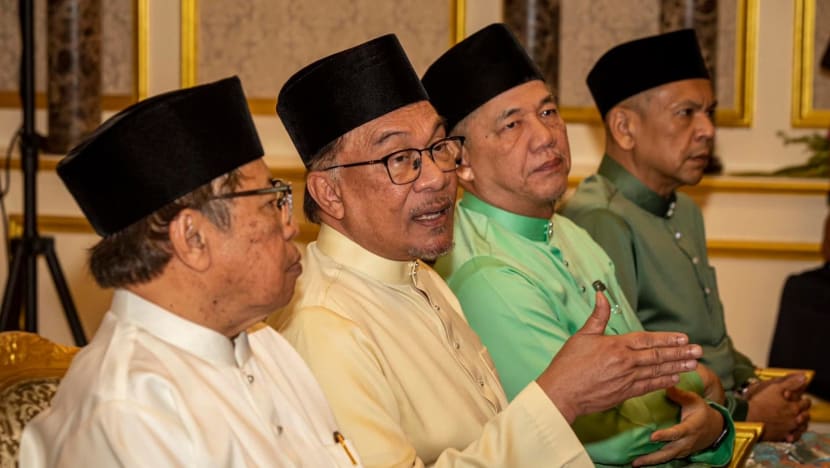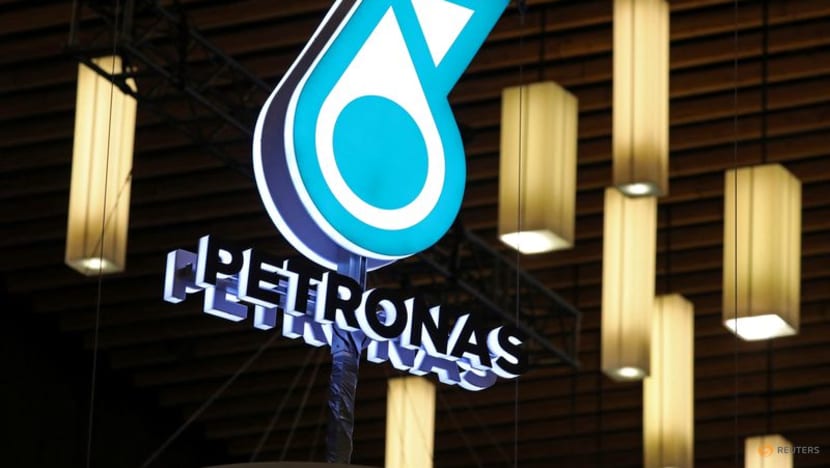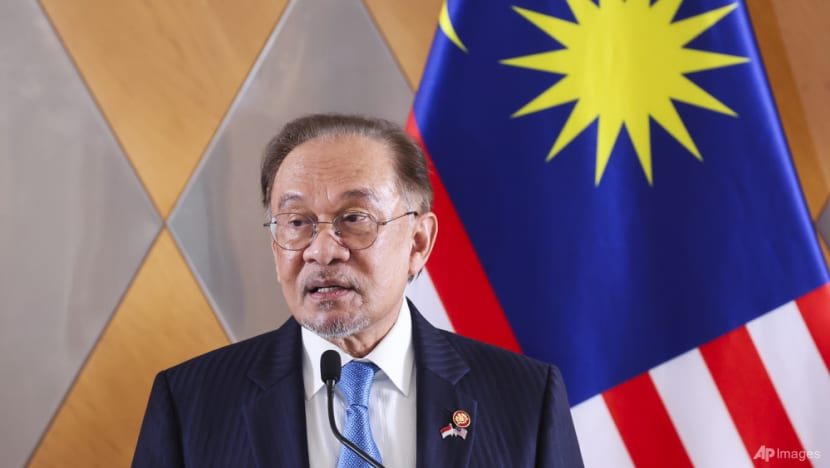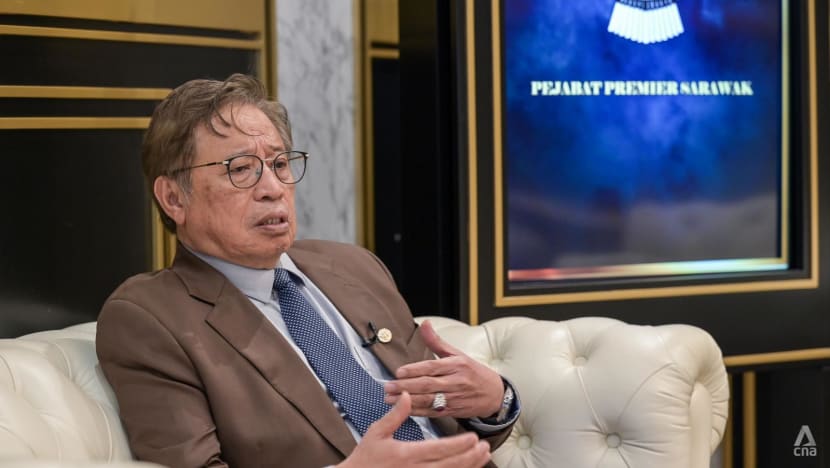analysis Asia
‘Puzzling’: Malaysia’s new rules for Sarawak’s oil and gas sector set to trigger fresh political tensions
The Malaysian government’s rejection of Sarawak’s demand for more control of its liquified natural gas resources has rankled politicians in the East Malaysian state. Negotiations between Petronas and the Sarawak government have broken down, sources tell CNA.

(from left) Sarawak premier Abang Johari Openg, Malaysia Prime Minister Anwar Ibrahim and Deputy Prime Minister Fadillah Yusof at an MA63 Implementation Action Meeting in Sarawak in 2023. MA63 refers to the legal instrument signed in 1963 as the basis of the formation of the Federation of Malaysia. The agreement recognises Sabah and Sarawak not as mere states but as equal partners with West Malaysia. (Photo: Facebook/Fadillah Yusof)

This audio is generated by an AI tool.
KUALA LUMPUR: Amid a determined push by Sarawak for greater autonomy, the Malaysian government has signalled that national oil corporation Petroliam Nasional Bhd will remain the sole guardian of the country’s oil and gas reserves including in the Borneo state, setting the stage for a fresh round of tensions.
In disclosures in Parliament last week, Law Minister Azalina Othman Said said that Petronas would retain its dominant role as enshrined in the 1974 Petroleum Development Act (PDA) and that new legislation enacted by the Sarawak government would remain subservient in developing the oil and gas sector.
The government also rebuffed a push by Sarawak to have its own oil company, known as Petroleum Sarawak Bhd (Petros), to assume the role as gas aggregator for the state’s liquified natural gas (LNG).
Such a designation would have been hugely important because it legally defines the entity which can carry out the procurement of natural gas for distribution, as well as development and exploration of gas in the state.
While the Malaysian government acknowledges the role of Petros as the sole gas aggregator following the company’s appointment by the Sarawak state government in February last year, Azalina said all matters related to LNG would remain under the control of Petronas, marking a huge setback for Sarawak in its bid for more control over its natural resources.
POLITICAL POWDER KEG
The reason why Kuala Lumpur’s latest position could become a political powder keg is because Azalina noted that the new terms were a result of a pact between Prime Minister Anwar Ibrahim and Sarawak premier Abang Johari Openg in a previously undisclosed meeting on Jan 7.
“This is a very serious matter and the Abang Johari government must explain where he and the Sarawak ministers agree to this,” Chong Chien Jen, the Sarawak chairman of the Democratic Action Party (DAP), which is part of Anwar’s ruling coalition, told CNA.
Chong, who represents Stampin constituency in Sarawak, was the politician who filed the parliamentary question seeking details of the terms of settlement between Petronas and Sarawak with regard to Sarawak's rights to the oil and gas extracted from the state.
Azalina’s parliamentary reply was in response to his question.
“We are being exploited as a state, and I consider this the second sellout of Sarawak after the PDA,” Chong told CNA in a telephone interview, who stressed the state was being deprived by terms that favour Petronas.
He added that Sarawak has five ministers in the Anwar cabinet, including Deputy Prime Minister Fadillah Yusof, and since the matter was disclosed by the Law Minister, the new rules to regulate the oil and gas sector in the state had to be a collective cabinet decision.
Sarawak government sources said that the whole situation remains unresolved and Azalina’s recent statement has caused unease with Abang Johari, who has in turn directed asked Fadillah to deal with the situation at the federal government level.
“The claims by the (federal) government are very ambiguous because if the state laws are recognised, why is Sarawak not being given control,” said Abdul Karim Rahman Hamzah, who is the state’s minister for tourism, culture and sports, in a telephone interview.
“The whole situation is very puzzling,” he added.
Abang Johari has yet to comment on the latest terms disclosed by Azalina. A senior official at Sarawak’s Attorney General’s Office said the state government has “no comments to make at this time”.
Petronas also declined official comment on the matter.

CAN THE DIFFERENT LAWS CO-EXIST?
Sarawak, which has long pushed for greater control over its hydrocarbon resources, has been locked in months of hardball negotiations with the Malaysian government and Petronas over the national oil giant’s monopoly over the country’s oil and gas reserves as enshrined under the PDA.
Sarawak, which insists that the PDA does not apply to it, has passed laws to govern its oil and gas sector and in February last year appointed Petros as the sole gas aggregator for the state, a move that directly challenged the authority long held by Petronas.
The eastern state holds about 60 per cent of Malaysia’s gas reserves and contributes almost 90 per cent of Malaysia’s LNG exports.
Both parties have tried to reach a compromise in talks that began sometime in April last year, but talks have broken down twice, with Petronas suspending all negotiations in December, according to executives from the national oil corporation.
Senior Malaysian government officials who spoke to CNA on condition of anonymity said the latest confusion stems from efforts by the Anwar administration to push Petronas and the Sarawak government into reaching a compromise.
“The real problem here is that talks have broken down between the parties and that is why Petronas and Sarawak can’t make any statements,” said one senior government official close to the situation.
Petronas officials, who also spoke anonymously, said the situation had become untenable in recent months after the Sarawak government began enforcing licensing requirements for private oil and gas companies operating in the state.
“The enactments of laws by the state (Sarawak) government have complicated the situation,” said the government official, adding that it has “caused a lot of uncertainty among international investors”.
“What went through Petronas in the state (under the PDA) before, now must go through Petros and that is making things difficult not only for us (Petronas) but also the foreign independent contractors.”
Sarawak’s Distribution of Gas Ordinance 2016 stipulates that any party carrying out gas distribution activities in the state should apply for a licence.
But in her written parliamentary reply, Azalina said that based on the agreement between Anwar and Abang Johari, Petronas and its subsidiaries are not required to obtain a licence or comply with additional procedures to conduct petroleum operations in Sarawak beyond what is outlined in Act 144, which is the PDA 1974.
There are even some who doubt the different sets of laws governing Petronas and Petros can co-exist.
Zaid Ibrahim, a prominent Malaysia lawyer and a former minister overseeing legal affairs, told CNA that Anwar’s remarks in mid-January over a compromise reached are misplaced.
“There can’t be two sets of laws, such as the PDA and the Sarawak Distribution of Gas Ordinance, because it will only lead to more conflict, and foreign investors want certainty,” he said.
Zaid believes that a new approach is needed.
“The best will be to have a holding pattern with Petronas operating as before and both parties turning to the courts to settle the issue,” he said.

POLITICAL CHALLENGE
The worsening flap with Sarawak is presenting the federal government with a serious political challenge.
Sarawak’s ruling coalition, known as Gabungan Parti Sarawak (GPS) or the Sarawak Parties Alliance, has long sought greater autonomy over its affairs, ranging from education and the management of its economy.
Since becoming premier in November 2022, Anwar has granted several concessions, including establishing two deputy premier positions with one filled by Fadillah, who hails from Sarawak.
The Anwar government has also allowed schools in the state to use English as the medium of instruction in schools, as opposed to the Malay language which is practised in the rest of the country.
Separately, Anwar’s administration has approved major financial transactions pursued by Sarawak.
Last September, the state government acquired a controlling 31.25 per cent equity interest for RM1.78 billion (US$399 million) in Affin Bank Bhd, the country’s 13th largest financial institution by asset size.
Last month, it took over the operations of MASwings, the east Malaysian regional operations of national air-carrier Malaysia Aviation Group, which Abang Johari said paved the way for the state to have its own airline.
But Sarawak's demand to wrest control of the country’s largest oil and gas reserves and break Petronas’s monopoly as the sole guardian of Malaysia’s hydrocarbon resources is fast shaping up into a serious political conundrum for the Anwar government.
PETRONAS’ IMPORTANCE TO NATIONAL COFFERS
The stakes could not be higher, particularly for the Malaysia government, which is saddled with huge public sector debt and relies heavily on Petronas to fund government business.
According to official data, Petronas, which reports directly to the PM, paid RM12 billion to the government in the first half of 2024. RHB Research, a unit of RHB Bank in Malaysia, noted that “this is on track to a full year payment of RM32 billion”.
In its latest published results, Petronas posted a profit before tax of RM32 billion for the six months ending June 2024, a 19 per cent decline over the same six-month period in 2023, on the back of revenues of RM157 billion, which was 2 per cent higher than the previous period under review.
A big chunk of this is because of Sarawak.
Any break in Petronas’s monopoly would significantly impair the oil corporation’s financial contributions to national coffers and limit annual allocation of oil-and-gas-related development expenditure, which amounted to RM25.7 billion in the first six months of 2024.
Bankers and financial executives in the Sarawak state capital of Kuching noted that the demands for greater control over the oil and gas sector have been part of a carefully laid-out campaign by the Abang Johari administration going back to 2015.
The financial executives noted that a team of just over a dozen state legal officers have been researching the archives in the United Kingdom on laws that governed the state when it was a British protectorate and after it joined what was then Malaya, together with Sabah, to create the federation of Malaysia in 1963, which at the time included Singapore.
Singapore became independent in 1965.
Sarawak is relying on a pre-independence Oil Mining Ordinance to assert its rights over the state’s oil and gas resources and other land code legislation that stipulates that its continental shelf stretches 200 nautical miles out to the sea, as opposed to the current PDA, which limits the territorial waters to three nautical miles from the coast and assigns all rights beyond that to Petronas.
The Sarawak government put its plan into action in 2016 when it enacted the state’s Distribution of Gas Ordinance and later in February last year appointed Petros as the sole gas aggregator for the state.
Government officials and Petronas executives have noted that the haggling with Sarawak has spooked Malaysia’s LNG customers in international markets such as China, South Korea and Japan.

LEGAL SKIRMISHES
The dispute between Petronas and Petros has also produced a couple of sideshow legal skirmishes that underscore the far-reaching implications of the ongoing federal government-Sarawak spat.
The first legal challenge was filed by Petros against Petronas in mid-October at the Kuching High Court over the national corporation’s demand for payment of RM7.05 million tied to a bank guarantee under a gas sales agreement signed in end-December 2019.
In court documents reviewed by CNA, Petros is arguing that the 2019 gas sales agreement is “illegal and void” because Petronas failed to obtain the “necessary license” under the Distribution and Gas Ordinance enacted by the state in 2016.
Petros added that honouring the RM7.05 million claim would be “endorsing and furthering an illegal agreement”.
In a separate court dispute, a Malaysian unit of international oil giant Shell obtained an interim order in January from the Kuala Lumpur High Court to temporarily suspend payment on natural gas supplies from the Bintulu gas facility in Sarawak.
The High Court granted an interim injunction to Shell MDS Malaysia Sdn Bhd to continue its operations without any disruption in supply until the legal tussle between Petronas and Petros are resolved.
According to local media reports, Shell MDS said it faced the risk of double payments and potential operations disruption at its Bintulu facility if the matter remained unresolved.


















